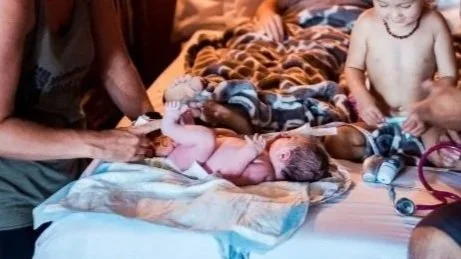
Our Services:
Free Standing Birth Center and Home Birth Midwifery Services
Prenatal Care
Prenatally we cover routine things like ordering labs and ultrasounds; and checking BP, fundal height and heart rate. We also check in on nutrition, sleep and stress levels.
Each step of the pregnancy we give more information about the tests offered through the medical model of care and why they are offered and discuss options for alternatives or declining.
You will have an easy to navigate electronic health record system with educational support, appointment reminders, electronic consents and a messaging system.
You’ll get a direct line to the midwife for urgent concerns and can expect routine prenatal care as follows but adaptable:
Monthly Prenatal Visits from 12-32 weeks
Bi-Weekly Prenatal Visits from 32 -40 weeks
Weekly Prenatal Visits after 40 weeks.
Postpartum Care
At 1 day postpartum we check on both you and the baby, check in on how nursing is going, newborn patterns, answer any questions you may have and do the first two parts of the newborn screenings, the CCHD screening and the metabolic screening.
At 3-5 days we will check in again and answer any breastfeeding related questions. This is when we often do the newborn hearing screening, although it may be deferred to the next visit.
We see you again at 2 weeks, we like to see baby back to their birth weight and offer continued support to ensure everything is normal.
The last visit is the 6 week checkup. We discuss normal expectations, fertility and conception awareness and prevention, family adaptation, normal mood and more.
Although we are officially done with care at this point, we consider ourselves your midwives for a lifetime and are always happy to hear updates and help you get the support you need.
Labor and Birth
We are on call beginning at 37 weeks.
We will keep in close contact with you as labor begins and the team will meet you at the Birth Center or at Home after active labor is well established.
We use a doppler to monitor heart tones throughout labor so we can be non-invasive and listen wherever you are.
About an hr after birth we do a full newborn exam and about 2-3 hrs after the birth we load you up in your car to head home.
We are still considered on call in case anything comes up this first few days.
Home Birth
If you are within the radius for homebirth, it can be a great option, particularly for people who have already had an unmedicated birth. Our care remains the same prenatally as it would for a birth center birth, with the exception of an added homevisit towards the end of pregnancy so we can have a good idea of where to find you in labor.
We bring all the same equipment we would have for a birth center birth.
Water Birth
Most people when given the opportunity spend time in the water during labor and about 50% of the time, the baby is born in water. Benefits may include easier to change position, decreased risk of perineal tearing, it tends to “take the edge off” and increase the ability to cope well with contractions. Its not uncommon for water born babies to not cry right away, it seems to be a gentle transition for them.
Birth Prep Class
A class specifically curated with you in mind. In this class we cover what to expect in labor and birth both physiologically and emotionally and what to expect after the birth. We go over what we bring to a birth, what an emergency could look like, breastfeeding basics and more.
Our theory is that when our families are well informed on what to expect, things go more smoothly for them and for the midwives.
Breastfeeding Support
Generally we do everything we can to support the breastfeeding relationship from birth. Sometimes nursing is trickier than anticipated and we are available to support you with education, hands on support and tongue tie evaluations. When baby is unable to nurse effectively beyond our understanding, we have lots of options to refer out to Lactation counselors, pediatric dentists, chiropractors, CST and more.
Newborn Screenings
We offer all three parts of the Newborn Screenings:
The CCHD screening for Critical Congenital Heart Defects.
The Newborn Hearing Screening.
The Metabolic Screening.
Michigan.Gov
Fertility Support/ IUI
Preconception consults can include: Creating a plan for preparing your body to become pregnant; nutrition, supplement and stress reduction strategies.
We will help you understand how your cycle works and how to track signs of fertility and review your medical history and risk factors.
Intrauterine insemination (IUI):
IUI is a procedure in which washed sperm is placed directly into the uterus through a small catheter (tube) that goes through the cervix. As midwives, we can do this procedure in the comfort of your own home, where your comfort and autonomy are our top priorities. We work together to determine ovulation and the best day/time for the procedure(s) to take place to increase the likelihood of conception.
Well Woman/Well Person Care
We can perform a head to toe Well Woman/Well Person exam including a Pap smear when indicated.
Health begins with knowledge and awareness of self. We practice in an affirming manner that encourages you to deepen your connection with self, always explaining and offering time for questions and thoughts.
Our goal in particular is to support people who are uncomfortable within the traditional healthcare setting.
We believe strongly in a community model of care, with integrating other practitioners & their expertise when appropriate.
Delivering your baby outside the hospital is sacred and requires a family to be self responsible, communicate openly, and trust in themselves, their partners and their midwives. By choosing to birth outside of a hospital setting, a family recognizes that they are in a comfortable environment that allows the birth to innately happen more naturally, most of the time leading to a safer, easier birth.
However, no midwife can promise a risk-free birth, and being away from a hospital could cause delays in medical care, should intervention be needed.
A family needs to trust their midwife's ability to gauge safety, and abide by her decision to go into the hospital if she believes that to be necessary.











